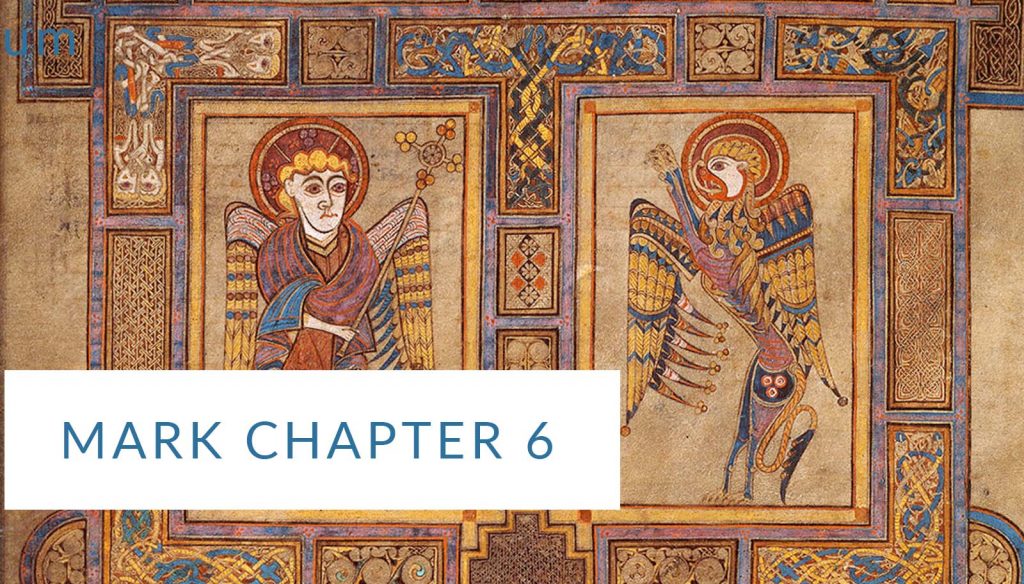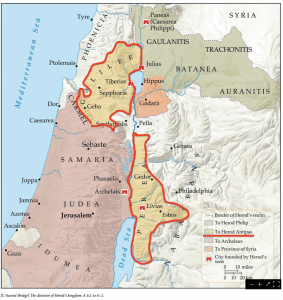This week's readings are all from Mark chapter 6. Click here to see the full reading and a list of each day's readings. Each day's segments of the readings will be posted on this site during the week.
Today's Reading:
For Herod himself had sent men, arrested John, and bound him in prison on account of Herodias, his brother Philip’s wife, because Herod had married her. For John had repeatedly told Herod, “It is not lawful for you to have your brother’s wife.” So Herodias nursed a grudge against him and wanted to kill him. But she could not because Herod stood in awe of John and protected him, since he knew that John was a righteous and holy man. When Herod heard him, he was thoroughly baffled, and yet he liked to listen to John.
But a suitable day came, when Herod gave a banquet on his birthday for his court officials, military commanders, and leaders of Galilee. When his daughter Herodias came in and danced, she pleased Herod and his dinner guests. The king said to the girl, “Ask me for whatever you want and I will give it to you.” He swore to her, “Whatever you ask I will give you, up to half my kingdom.” So she went out and said to her mother, “What should I ask for?” Her mother said, “The head of John the baptizer.” Immediately she hurried back to the king and made her request: “I want the head of John the Baptist on a platter immediately.” Although it grieved the king deeply, he did not want to reject her request because of his oath and his guests. So the king sent an executioner at once to bring John’s head, and he went and beheaded John in prison. He brought his head on a platter and gave it to the girl, and the girl gave it to her mother. When John’s disciples heard this, they came and took his body and placed it in a tomb. (Mark 6.17–29 NET)
The previous translation is from the NET Bible translation. Scripture quoted by permission. Quotations designated (NET) are from the NET Bible® copyright ©1996, 2019 by Biblical Studies Press, L.L.C. All rights reserved.
Resources for the Reading
John the Baptizer
The first-century Jewish historian Josephus also describes the imprisonment and death of John the Baptizer, though he gives different reasoning for Herod Antipas' decision. According to Josephus it was Antipas' fear that John would lead a rebellion. Josephus also notes John's righteousness and favor with God:
(18.5.2) Now, some of the Jews thought that the destruction of Herod’s army came from God, and that very justly, as a punishment of what he did against John, that was called the Baptist; (18.5.2) for Herod slew him, who was a good man, and commanded the Jews to exercise virtue, both as to righteousness towards one another, and piety towards God, and so to come to baptism; for that the washing [with water] would be acceptable to him, if they made use of it, not in order to the putting away [or the remission] of some sins [only], but for the purification of the body; supposing still that the soul was thoroughly purified beforehand by righteousness. (18.5.2) Now, when [many] others came in crowds about him, for they were greatly moved [or pleased] by hearing his words, Herod, who feared lest the great influence John had over the people might put it into his power and inclination to raise a rebellion (for they seemed ready to do anything he should advise), thought it best, by putting him to death, to prevent any mischief he might cause, and not bring himself into difficulties, by sparing a man who might make him repent of it when it should be too late. (18.5.2) Accordingly he was sent a prisoner, out of Herod’s suspicious temper, to Macherus, the castle I before mentioned, and was there put to death. Now the Jews had an opinion that the destruction of this army was sent as a punishment upon Herod, and a mark of God’s displeasure against him. (Antiquities 18.116–119 JOSEPH)
I envision Herod’s response to John the Baptist as how the world accepts the words of God. That is many will hear the word and many will like what it says at first but when the world is asked to change it’s ways to follow Jesus they turn away because the world is more pleasing to them. Herod could have chosen to follow God after hearing from John the Baptist but he chose the world instead.

